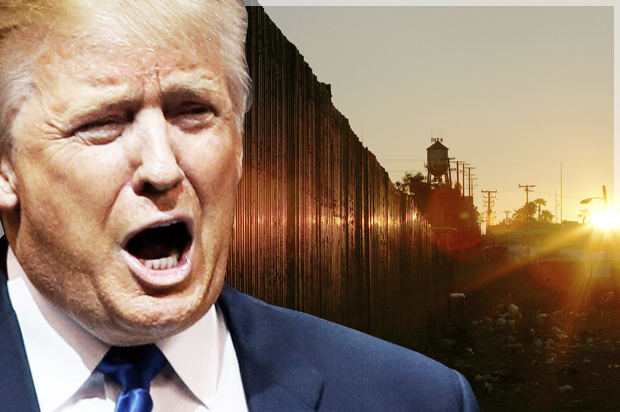President Donald Trump is not known for his eloquence, but at some point his inability to articulate becomes a serious problem.
Take this quote from his recent interview with CNBC at the World Economic Forum in Davos, Switzerland.
But we need a strong border. And to do that you need a wall. And they did agree to a $25 billion wall, of which I’ll have a lot of money left over. Because I don’t need $25 billion to build a wall. We’ll build a great — that’s what I do. We’ll build a great wall and we’ll have a lot of money left over, and we’ll spend it on other things.
It sounded to me, upon reading this, that Trump had just suggested he could ask Congress for more money on his infamous US-Mexico border wall than he actually needs, then spend the difference on completely different programs. If that is what he said, then he doesn’t understand how the government works — which is not inconceivable, given who we’re talking about.
Then I spoke to a pair of experts, each of whom had different interpretations about what Trump meant. And that made me realize there is also a bigger problem: When it comes to incredibly important policy questions — ones that involve human rights, security and fiscal responsibility — it is impossible to figure out what Trump intends to say.
“Subsequent clarifications may be in the offing from the White House, probably not,” Will Marshall, the president and founder of the centrist and pragmatic Progressive Policy Institute, told Salon. “It sounds to me as though he may be saying that if he gets $25 billion then you know some of it will go for fencing, some of it may go to an actual wall, but some of it will go to satellite surveillance or sensors on the ground, other and frankly better means of securing the border than erecting an old-fashioned wall-type structure. That may be what he means, which is me giving him the benefit of the doubt, which I don’t usually do.”
Jordan Libowitz, the Communications Director of Citizens for Responsibility and Ethics in Washington, had a different theory.
“It depends on what kind of appropriation it actually is and how the money is appropriated,” Libowitz told Salon. “If it is money specifically for the construction or he might be talking about more general funding, then there’s also the matter how far into the process this allocation actually is. But it sounds like what he’s saying is that it’s gonna cost less than appropriated so the money will go back to the treasury.”
It is important to note that both Marshall and Libowitz told Salon that they didn’t know the full context of what Trump was trying to say. They don’t know how this plays into the ongoing negotiations occurring between the president and Congress (the White House recently cancelled a briefing on immigration reform scheduled for Monday) and they can’t say what Trump intended without further information about his overall policy goals.
And that, right there, is the problem.
We have a president who talks with disturbing looseness and ambiguity about $25 billion, about the lives of immigrants, about the security of our country and about one of the core themes of his presidential campaign, the mythical wall. If Trump truly believes that he can spend money allocated to one program on completely unrelated ones, then this needs to be the subject of intense conversation. If he meant to say that this money would be spent on “other things” related to border security, then he needs to specify what those other things are — and should be called out for failing to do so in Davos. The same thing goes if he wants to send that money back to the Treasury — he needs to explain why that is what he would do, as well as called out for not being clear at the time.
If you think that I’m being nitpicky here, that is because the bar has become so low that you may no longer hold our president accountable on the most basic level. The stakes are too high on the numerous issues entailed in that president’s mumbling, rambling response for it to simply be dismissed as “Trump being Trump.” Americans have a right to a president who can clearly communicate what he plans on doing with their money, and how he plans on securing their borders and protecting their most vulnerable communities.
Once we say that even that is asking too much, we forfeit our right to ask for pretty much anything.


